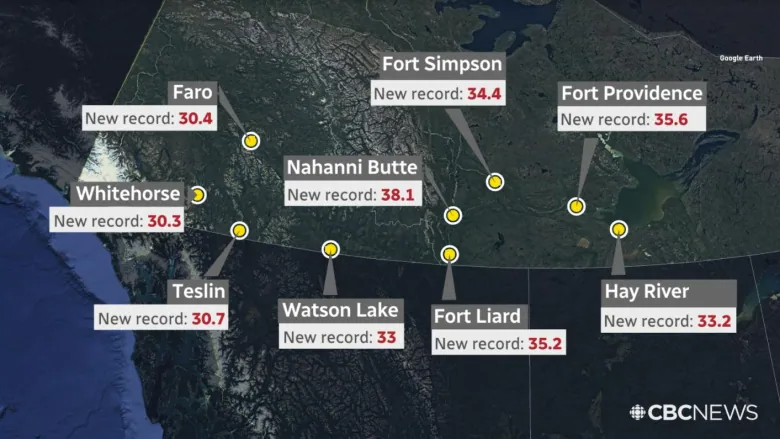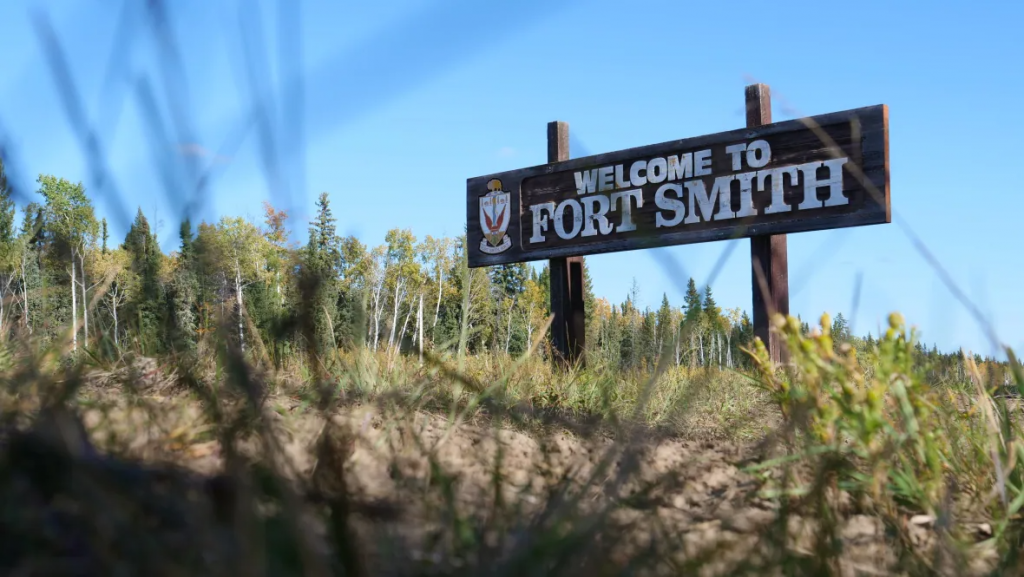CBC Explains – Setting the (temperature) record straight in Canada’s Northwest Territories

The hottest days on record in the N.W.T. are not the official hottest days on record
It was hot at the end of June throughout much of the Northwest Territories, but no all-time, territory-wide weather records were broken, at least not officially.
During that heatwave a temperature sensor at the Fort Smith airport recorded 39.9 C.
That June 30 temperature could have been a record for the N.W.T., but it’s not been made official because it’s based on data from the wrong temperature sensor.
The official hottest day registered in the Northwest Territories remains 39.5 C in Deline on Thursday, August 6, 2015. That Deline record broke the previous record of 39.4 C recorded in Fort Smith on July 18, 1941, something that has escaped notice on some fronts.
Whaddya mean ‘wrong temperature sensor’?
Fort Smith has two weather stations. There’s an Environment Canada climate station — built and maintained to exacting World Meteorological Organization standards — and a NAV Canada temperature sensor at the Fort Smith airport that isn’t.
The Environment Canada sensor generally provides official temperature records, but it was preoccupied on June 30.
Sara Hoffman, a meteorologist with Environment and Climate Change Canada in Edmonton, told CBC that it had gone into a routine diagnostic self-check late that afternoon. The good news is that the sensor works fine. The bad news is that it didn’t record the temperature during the hottest part of the day.
“So … at this time, we don’t have an official value or daytime high for June 30, 2021,” Hoffman said.
“What we can do is use the NAV Canada site as an estimate of the daytime high … but that estimated value would not go into records or establish a record for the territory.”

The 39.9 C recorded at the Fort Smith airport is also the temperature reported in Environment Canada’s historical weather data online, but with the caveat that it’s based on incomplete data.
The Environment Canada climate station for Fort Smith did record 38.6 C on June 30, but that’s not official either because of the self-diagnostic routine that turned the sensor off.
“Because the data is missing an hour, we unfortunately have to go through a process of quality control to see whether or not we can accept the data before it will make its way into our database,” Hoffman said.
Hotter day that doesn’t count
Unofficially, it’s been hotter in the territory — on July 20, 2002, a volunteer-run weather station at Rampart River recorded 40.6 C. This would have been the hottest day ever recorded in the N.W.T, but Environment Canada quality control experts had concerns.
“They were unable to unequivocally rule it [the recording] out, but they couldn’t find data to corroborate it,” Hoffman said. “We can’t say that’s an official record.”
So officially, and for the record, the N.W.T. hot weather records are: Deline with 39.5 C on Aug. 6, 2015; Fort Smith with 39.4 C on July 18, 1941; and Fort Simpson, with 38.8 C on July 9, 2010.
But unofficially, temperatures hit 40.6 C at Rampart River in 2002, and on June 30 in Fort Smith it was 39.9 C.
So it was hot, what’s the big deal?
Those high temperatures in Fort Smith were unusual for June.
The average temperature for June 30 is 23 C. That makes temperatures pushing 40 degrees on that day an anomaly. And it surpasses the previous high for the day by several degrees.
“The previous record for June 30 in Fort Smith was 31.7 C and that was set in 1955,” Hoffman said.
The heatwave that hit the southern part of the territory was part of the widely reported heat dome now considered a one in 1,000-year event. Hoffman said scientific consensus blames human-caused climate change for the intensity of the heat.
“I can’t think of a single other event where we’ve been able to say, ‘The intensity of this event would not have been at this level had it not been for climate change,'” Hoffman said.
Related stories from around the North:
Canada: ‘Prolonged, dangerous and historic’ heat wave bakes much of western Canada, including North, The Canadian Press
Greenland: Tipping points: can a leaked report tip the scales to climate action? Blog by Irene Quaile
Norway: Polar bears face extinction in Svalbard and Arctic Russia says scientist, The Independent Barents Observer
Russia: Record breaking temperatures recorded in Arctic Russia, Eye on the Arctic
Sweden: Sweden’s wildfire season later than usual, Radio Sweden




The unprecedented heatwave a few weeks ago, described by meteorologists as more of a stalling “heat dome” phenomenon, left me feeling I would never again complain about the weather being too cold. A Metro UK online piece was telling local readers their internet signal may be disrupted by the extreme heat. I say to them, worry much more about your health, or even life, getting disrupted than the temporary loss of access to your favorite social media platforms, etcetera. …
Clearly there has been discouragingly insufficient political courage and will to properly act upon the cause-and-effect of manmade global warming and climate change. To me, general human existence has for too long been analogous to a cafeteria lineup consisting of diversely societally represented people, all adamantly arguing over which identifiable person should be at the front and, conversely, at the back of the line. Many of them further fight over to whom amongst them should go the last piece of quality pie and how much they should have to pay for it — all the while the interstellar spaceship on which they’re all permanently confined, owned and operated by (besides the wealthiest passengers) the fossil fuel industry, is on fire and toxifying at locations not normally investigated.
But there’s still some hope for spaceship Earth and therefor humankind due to environmentally conscious and active young people, especially those who are approaching/reaching voting age. In contrast, the dinosaur electorate who have been voting into high office consecutive mass-pollution promoting or complicit/complacent governments for decades are gradually dying off and making way for voters who fully support a healthy Earth thus populace.